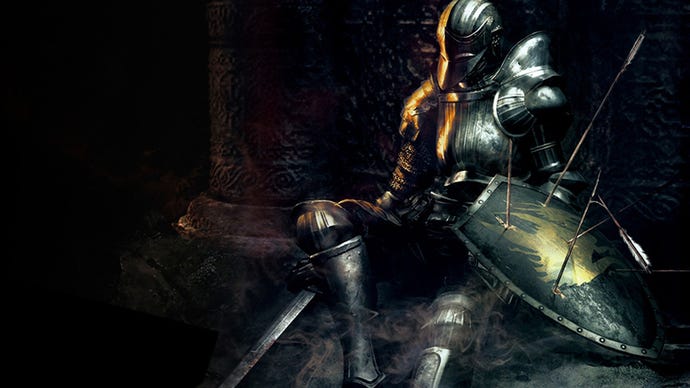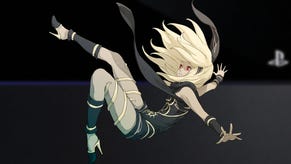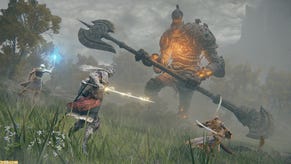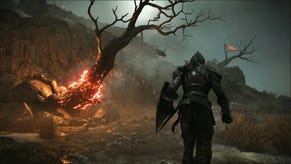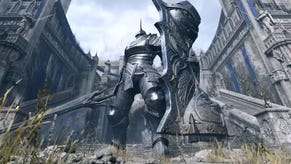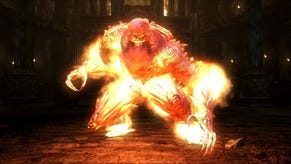Seven years on, Demon's Souls is still shaping the way I think about games
Demon's Souls is seven years old today. Nothing has ever bested it.
When you start a new character in an RPG, how do you decide on your build?
Me, I'm a big fan of the glass rogue. I don't see the point in taking damage; I'd rather avoid it completely. Strike from the shadows, or from a distance; eat away at them with status effects or bleed them with persistent damage. If you must be seen, be too fast to be hurt.
This is my default approach to RPGs, and it usually ends up working out into something like my Fallout 4 Infiltrator build. If a game allows it, my first instinct is to find ways to break it with stealth, sniping and subtlety.
An old friend of mine got in touch recently and mentioned how strange they found it that I'd ended up such a fan of rogues. Back in my live role playing days, they reminded me, I'd almost always play some sort of samurai character, or an armoured knight, and this preference extended to video games. What changed? Why did I abandon my beloved tanks?
I know precisely why: Demon's Souls.
Demon's Souls is seven years old today; it first launched on February 5 2009. A spiritual successor to the King's Field series, the brutally punishing RPG spoke to a very specific kind of Japanese gamer: those who'd grown up playing baffling, badly-translated (or unlocalised!) western RPGs. It was the sort of situation that gave rise to the great Wizardry schism; the humour of the parody RPG was lost in translation, and the series has a long, po-faced legacy in Japan that seems bizarre to those involved with the original seed.
Nothing ever feels as awe-inspiring, as challenging, as enigmatic, as surprising, as different or as beautifully satisfying as that first run through the terrifying and beautiful Demon’s Souls.
In the early days of RPGs traveling west to east, fans would gather on bulletin boards to share tips and advice on how to unpack pages of incomprehensible text and leverage unfamiliar, unexplained gameplay systems. To recreate this feeling, From Software implemented its now famous asynchronous notes system, emulating the collaborative problem solving and regular trolling of those early RPG fans.
The way Demon's Souls, Dark Souls and Bloodborne refuse to explain themselves to you, peppered as they are with items of dubious use, mysterious references and esoteric synergies, gives you a shadow of the experience of what it was like for Japanese RPG fans before local developers took up the now ubiquitous systems of levelling, inventory, customisation - whatever it is that makes an RPG, as passed down to us by Gary Gygax.
Those games were hard; they were unforgiving even when you did know what was going on. From Software tapped into that difficulty, translating it beautifully into action gameplay reliant on timing and duelling tactics, and then exaggerated it with a deep layer of mystery.
Sony published Demon's Souls on PlayStation 3 in Japan because it knew there was a fanbase for it; hell, Shuhei Yoshida is a fanbase all on his own. It seemed a far more dubious prospect for the west, and it fell to Atlus USA, long time champion of niche, hardcore Japanese titles, to do what it knew it must.
Demon's Souls released in North America on October 6 2009 - a remarkably quick turn around on a wonderful localisation, complete with Scottish voice actors and a perfect recreation of the still enigmatic characters of the Nexus and beyond. Atlus's modest resources, its status as a PlayStation 3 exclusive and its inarguably hardcore-only appeal prevented it become the sort of big name you see splashed across billboards and half-time at the Superbowl, but it was definitely not a secret, with at least 150,000 sales in its first month. IGN and Gamespot both awarded it very high review scores (its Metacritic average places it among the best games of all time) and word of mouth was even more flattering.
This was three and a half years after Twitter launched, before the microblogging site as we called it then become the fraught wilderness it is today. It was a great place to connect with other game fans, and all of them on the Atlus side of the ocean were screaming about Demon's Souls. At the time, I was quietly networking with our EIC, Pat, in the hopes of spotting a job opening (it worked out). He said in a tweet that he'd imported Demon's Souls, as many Europeans were doing, because he was sick of not knowing what everyone was going on about. A week or two later he tweeted that it was amazing.
I got out my credit card, and that was the end of my life for, oh, a year.
Like everyone else who went in blind and lulled by years of frictionless triple-A releases, Demon's Souls brought me up short with its difficulty. Running in and mashing buttons didn't work.
First experience of the Souls family of games so often reduces even veteran gamers to tantruming children - "I wasn't ready, it's not fair, he's so much bigger than me" - because we've been trained to believe the pick up and play approach is "good design" and anything else is "bad design". (The truth of the matter is that power fantasies are an easy sell, as we are all so vulnerable to having our buttons pushed by publishers.)
I did not have this reaction - because I have a huge inferiority complex, partially grounded in a developmental disorder that makes it very hard for me to learn and perform physical tasks. As a result of this condition I'm pretty bad at action games, which is unfortunate in this line of work and occasionally causes deep offence to people who think they want my job. Only constant practice keeps me ahead of randos off the street who've never seen a control pad before.
So when I walked into that first arena in Demon's Souls and was murdered within seconds, I didn't rant and rave and send the disc back, as so many people did (including many of my dear friends). "Yes, this is my lot in life," I thought, sadly. "Of course this happened. It happened because I am s**t."
I had no idea that Demon's Souls was supposed to be super hard but a few minutes in the first stage clued me in; grunt enemies should not be such a hassle! I hadn't felt this clueless and unskilled in years, and was reminded of my first time playing Tomb Raider - carefully saving my game after each and every jump because, even with PSOne loading times, it was faster than laboriously climbing back up. Years later I had mastered Tomb Raider's clunky-ass controls, so I figured I would master Demon's Souls, too. I was determined to understand what all the fuss was about, so Pat would give me a job.
Unable to find the first lever, I eventually turned to a guide: Cold_Drake's GameFAQS epic. I still have portions of this guide memorised, and I was never more broken hearted than when From Software patched out the double enchant exploit that made this build so deadly right before I made my Black Phantom run.
The Assassin build Cold_Drake champions, and their slow and careful approach to the game, is perfect for me: they specifically set out to avoid all that rolling, dodging, duelling business by using every cheap trick in the game. I fell in love with glass rogues, and with working my way around the developer's plans to leverage systems in ways they never intended. I fell in love with one shot kills, with tactical retreats, and with never letting them go toe-to-toe.
Seven years after Demon's Souls first released, I'm still playing glass rogues whenever the option presents itself. My Dragon Age: Origins Warden is a monster. My Oblivion and Skyrim assassins are beasts. My Fallout 4 character has gone slightly viral.
And nothing ever feels as awe-inspiring, as challenging, as enigmatic, as surprising, as different or as beautifully satisfying as that first run through the terrifying and beautiful Demon's Souls.
When Bandai Namco finally delivered Demon's Souls to Europe and Australia in June 2010, I bought another copy - as did many who'd already imported it. It passed half a million global sales within a few months of PAL launch, and went on to sell at least 1.7 million copies. That's not Call of Duty numbers, obviously, but it's in no way small potatoes. It was enough for Bandai Namco to fund a "spiritual successor", which became a whole series, and eventually we got Bloodborne out of it, too.
Bloodborne and the Dark Souls series are great, but they're not quite Demon's Souls. Nothing can ever capture that feeling of mystery - especially not repeat visits - and the fandom is so large and co-ordinated these days that each new tidbit is torn to pieces as soon as it releases. (Bloodborne's Platinum trophy was in player hands in under two weeks.) The cult of hardcore difficulty that has built up around From Software colours a newcomer's approach.
I don't remember the last time I switched my PlayStation 3 on but today - on Demon's Souls birthday - I think I just might.
Boss images collated by jv9ufxcy on Imgur.
